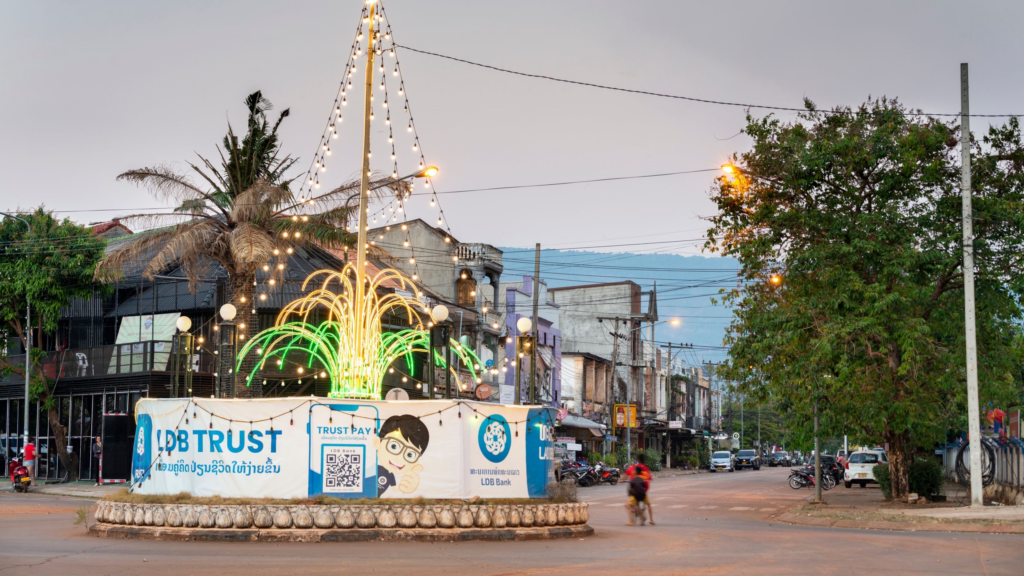
Image: Neil Bussey / Shutterstock.com
SINGAPORE, November 9, 2023 – The Lao PDR’s economy is expected to maintain its recovery from the COVID-19-pandemic in 2023. However, currency depreciation and surging inflation are challenges to sustaining the economic recovery. Ensuring tighter discipline in fiscal and monetary policies is essential to re-establish macroeconomic stability.
These conclusions are highlighted in the 2023 Annual Consultation Report on Lao PDR published by the ASEAN+3 Macroeconomic Research Office (AMRO) today. The report is based on AMRO’s Annual Consultation Visit to Lao PDR in May 2023, and data and information available up to July 3, 2023.
Economic outlook
Lao PDR’s economic growth is projected to accelerate to 4.8 percent in 2023 from 4.4 percent in 2022, bolstered by the service sector. Following the full reopening of borders and the operation of the high speed Lao-China railway, the tourism and logistics sectors benefitted from enhanced connectivity with neighboring countries, especially China. Inflation surged to 23 percent year-on-year in 2022, driven by rising food and fuel prices, and is projected to average about 30 percent in 2023.
The external balances are expected to improve in 2023, supported by the recovery of tourism and FDI, on the back of enhanced connectivity and increased business opportunities in renewable energy. The exchange rate depreciated sharply in H1 2022, triggered by an increase in fuel imports and amplified by accelerated currency substitution. Monetary tightening through the issuance of short-term central bank bills to mop up excess liquidity has helped stabilize the exchange rate. Notwithstanding, the currency started to depreciate again after February 2023.
A sustained cut in current expenditure and rebound in revenue led to an improvement in the overall fiscal balance in 2022. The deficit is expected to widen in 2023 due to an increase in capital expenditure and a drop in overall revenue due to the absence of one-time licensing fee revenue from crypto-industry and some mining pilot projects. Despite continued improvement in the primary balance, public debt has increased due to the issuance of arrear clearance bonds in 2021 and the recent currency depreciation.
Risks, vulnerabilities, and challenges
The external environment poses a risk to the economic outlook. Slower than expected recovery in China would weigh on Lao PDR’s growth and external position via lower exports and FDI. Another round of kip depreciation could accelerate inflation and weaken the balance sheets of firms, particularly those with currency mismatch in debt service versus revenue.
The government debt-to-GDP ratio would increase further with renewed kip depreciation. Ongoing arrear clearance could also increase the government debt. Continued financial weakness in state-owned companies could impose a fiscal burden on the government.
Pockets of financial vulnerability remain as banks’ impaired loans could be higher. Nonperforming loans could increase upon the withdrawal of regulatory forbearance and/or if restructured loans of the electricity sector were to turn into bad debt. The recent kip depreciation would likely affect the debt servicing capacities of borrowers with foreign currency loans but with earnings in local currency.
Policy recommendations
The central bank should tighten its monetary policy further. The central bank should reduce its credit provision to banks and other sectors in the economy. Issuing BOL bills with high interest rates to mop up liquidity outside the banking sector should be minimized. The central bank should sterilize the liquidity injected from its purchase of arrears-clearance bonds by raising the reserve requirement ratio or issuing BOL bills to the banks.
The authorities are encouraged to adopt market-friendly policy measures to increase the FX supply in the onshore market. The use of FX management measures, which are administrative in nature, should be temporary and time-bound. Policy details should be clearly communicated to the relevant stakeholders in a timely manner. Policy measures to strengthen the banking sector’s soundness should be stepped up.
Ensuring fiscal discipline is crucial to prevent further arrears from recurring. The capital expenditure ceilings introduced to ministries and local governments should be accompanied by rigorous monitoring and enforcement of spending commitments. Furthermore, the authorities should increase efforts to enhance public finance management.
The authorities should continue their fiscal consolidation efforts by improving revenue mobilization. The VAT rate should be restored to 10 percent. The reform of the state-owned electricity company should be accelerated to repay its debt to the government, which will reduce the risk of government contingent liability. The government should consider raising electricity tariffs to the cost-recovery level for all sectors, while providing subsidies to offset the impact on vulnerable groups. Over the long term, the government should consider how to maximize the benefits from the transfer of the hydropower assets to the government under the Build-Operate-Transfer scheme to meet their financing needs.
Structural reforms should be expedited to bolster the momentum toward inclusive and sustainable growth. The transitioning of the Ministry of Industry and Commerce’s SME promotion department to the SME Promotion Agency is a welcome move to strengthen the operations of the existing SME Promotion Fund and to enhance SMEs’ production capacity. The vocational training program should also be reinforced to increase the supply of skilled workers, and business processes should be streamlined.
About AMRO
The ASEAN+3 Macroeconomic Research Office (AMRO) is an international organization established to contribute toward securing macroeconomic and financial resilience and stability of the ASEAN+3 region, comprising 10 members of the Association of Southeast Asian Nations (ASEAN) and China; Hong Kong, China; Japan; and Korea. AMRO’s mandate is to conduct macroeconomic surveillance, support regional financial arrangements, and provide technical assistance to the members. In addition, AMRO also serves as a regional knowledge hub and provides support to ASEAN+3 financial cooperation.
About AMRO’s Annual Consultation Report
The Annual Consultation Report was prepared in fulfillment of AMRO’s mandate. AMRO is committed to monitoring, analyzing, and reporting to its members on their macroeconomic status and financial soundness. AMRO also helps identify relevant risks and vulnerabilities, and assists members, if requested, in the timely formulation of policy recommendations to mitigate such risks.
